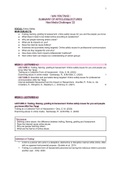1
- WAI YEN TANG -
SUMMARY OF ARTICLES&LECTURES
New Media Challenges ‘22
FOCUS: Online Safety
MAIN SUBJECTS:
● Trolling, flaming, griefing & harassment: online safety issues for you and the people you know
● What does it mean to be trolled online according to academics?
● Why are people harming others online?
● What are its impacts on you?
● Does the internet cause trolling?
● Scientists and journalists being targeted: Online safety issues for professional communicators
● What are they targeted for and why?
● How does online harm impact professionals’ livelihood?
● How online harm can impact our understanding of certain groups
WEEK 2 - LECTURES 4,5 1
LECTURE 4: Trolling, flaming, griefing & harassment: Online safety issues for you and people you
know (Wai Yen Tang)
Trolling as a Collective Form of Harassment - Ortiz, S. M. (2020)
Examining abuse in online media - Sambaraju, R., & McVittie, C. (2020) 1
LECTURE 5: Scientists and journalists being targeted: Online safety issues for professional
communicators (Wai Yen Tang)
Internet-facilitated Harassment and its Impact on Researchers - Doerfler, P., Forte, A., De
Cristofaro, E., Stringhini, G., Blackburn, J., & McCoy, D. (2021). 6
WEEK 2 - LECTURES 4,5
LECTURE 4: Trolling, flaming, griefing & harassment: Online safety issues for you and people
you know (Wai Yen Tang)
Trolling as a Collective Form of Harassment - Ortiz, S. M. (2020)
Examining abuse in online media - Sambaraju, R., & McVittie, C. (2020)
This lecture:
- Defining online abuse: the difference between trolling, flaming, griefing and harassment
- Does the internet cause online abuse
- Why are people harming others
- What are the harms of online abuse
Definition of ‘Trolling’
+ A troll is a person who acts in a deceptive, destructive or disruptive manner while online, often
with no apparent instrumental purpose - Buckels et al., 2014.
+ Trolling is a collective form of harassment perceived as having the malicious intent to provoke
another user - Ortiz, 2020.
, 2
+ Flaming is displaying hostility by insulting, swearing or using otherwise offensive language -
Moor et al., 2010.
+ Griefing, in simple terms, refers to the act of one player intentionally causing another player
grief for personal gain - Achterbosch et al., 2017.
+ Harassment is unwanted repetitive acts of emotional and psychological harm.
The definitions around trolling (trolling, flaming, griefing, harassment) are vague and tend to change
over time. They are mostly referred to as abusive, harmful, disruptive, deviant, anti-social, and
context-dependent.
Trolling according to the ‘Urban Dictionary’
‘Trolling is the deliberate act of making random unsolicited and/or controversial comments on various
internet forums with the intent to provoke an emotional knee jerk reaction from unsuspecting readers
to engage in a fight or argument.’
How do (American) people define trolling?
Ortiz (2020) surveyed 120 American online users about the definition of online trolling, what motivates
trolling, the experience of people that troll and have been trolled.
In the article trolling is described as:
+ A power dynamic: ‘exercising power’, domination over marginalized groups, racism and sexism.
+ Discrimination, affecting groups differently.
+ A distraction from important discussions.
+ Identity-based harassment.
+ Politically motivated
+ Resentment to societal changes
Does the internet cause online abuse?
ANONYMITY:
Would everyone’s identity made known make the internet safer? Being able to stay anonymous online
makes people more aggressive - this has been since the beginning of the internet.
There are various labelling of anonymity:
+ Anonymity vs pseudonymity:
+ Anonymity is a form of non-disclosure and comes in many variations, such as visual anonymity
(where they do not know what you look like, they do not know your face).
+ Pseudonymity is a form of social identification (an identity-marker) attached to you, such as a
Twitter username. It creates a pseudo-identity. They don’t know your face but you do exist in a way.
+ Untraceable anonymity is a bit more technical - it is based on whether you can be traced back to
your account for example. You can change your IP address to make it seem as if you are tweeting
from China for example when really you are located in the Netherlands.
+ With anonymity, there is an absence of social cues of the self and others - you do not know the
person behind an account, you do not know who they are, what they look like, where they come from,
how they think, etcetera. All the information you get is what they give you (based on their account and
tweets for example).
+ Absence of social contexts and cues might lead to online social conflict (Kiesler et al., 1984)
+ Because everyone is anonymous, they should also be considered equal? (Dubrovsky et al., 1991)
Because there is no identification marker, you don’t have any further information.




